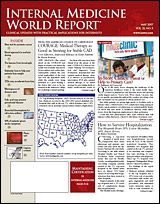A Veggie a Day Helps Keep BPH at Bay
American Journal of Clinical Nutrition
Turns out mom knew what she was talking about when she said “eat your veggies!” Men who follow this advice into adulthood can reduce their risk for benign prostatic hyperplasia (BPH), according to a recent study published in the (2007; 85:523-529).
Although not life-threatening, BPH does have symptoms that affect a man’s quality of life. This study looked at 32,265 men (aged 46-81 years at baseline) in the Health Professionals Follow-Up Study. Beginning in 1992, and biennially thereafter until 2000, the men reported whether or not they had undergone surgery for an enlarged prostate. Fruit and vegetable intake was assessed with a food-frequency questionnaire that was completed in 1986. In 1992 and on 3 subsequent questionnaires the men also completed the American Urological Association symptom index (AUASI).
Participants were separated into 2 groups: BPH cases, classified as men who had surgery or an AUASI score of 15 to 35 (n = 6092); and control cases, men who had not had surgery and whose AUASI score had never been higher than 7 (n = 18,373). Men who consumed more vegetables tended to be older, drink less alcohol, exercise more, have a lower body mass index, take multivitamins, and be less likely to smoke.
P
Vegetable consumption was inversely associated with BPH ( for trend = .03), but fruit intake alone was not.
Consumption of fruits and vegetables rich in the following substances was also inversely associated with BPH:
P
• Beta-carotene ( for trend = .004)
P
• Lutein ( for trend = .004)
P
• Vitamin C ( for trend = .05).
“Our findings are consistent with the hypothesis that a diet rich in vegetables and in [beta]-carotene, lutein, and vitamin C derived from foods may reduce the occurrence of BPH,” the investigators write.
Increasing vitamin C intake correlated with a reduced risk of BPH, but this risk reduction applied only to men who consumed vitamin C from foods, not from supplements.
Although BPH rarely causes symptoms before age 40, the investigators note that it is a condition that starts in young adulthood; therefore, future studies should examine dietary habits at that time, “especially in the context of BPH prevention.”
“A healthy diet that is rich in vegetables may reduce the risk of BPH. The consumption of approximately 6 servings of vegetables per day reduced the risk by 11%. This is consistent with the current recommendation for good health in general to consume at least 5 servings of vegetables and fruits per day,” lead investigator Sabine Rohrmann, MD, of the Deutsches Krebsforschungszentrum/ German Cancer Research Centre Epidemiologie von Krebserkrankungen/ Cancer Epidemiology, Heidelberg, Germany, told IMWR.
Dr Rohrmann continued, “We certainly recommend the consumption of foods rich in beta-carotene—carrots, yellow squash, yams, spinach, kale, romaine lettuce, cantaloupe melon, peaches. For this food group, we observed a decrease in risk by 13% in men who consumed about 1.5 servings of these foods per day. However, we also recommend that men [and women] consume a variety a vegetables, not only for BPH but for good health in general.”
The National Institute of Diabetes and Digestive and Kidney Diseases reports that more than half of all men in their 60s, and as many as 90% in their 70s and 80s, have some symptoms of BPH.
